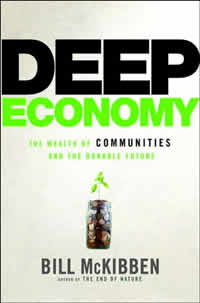Book Notes
 Bill McKibben, Deep Economy; The Wealth of Communities and the Durable Future (New York: Times Books, 2007), 261pp.
Bill McKibben, Deep Economy; The Wealth of Communities and the Durable Future (New York: Times Books, 2007), 261pp.
In this his newest book, Bill McKibben argues for the heretical notion that More is not Better. In fact, he says, More has become unsustainable, and is generating gross inequalities and insecurities, both among individuals and entire nations. He thus proposes a "quiet revolution begun by ordinary people with the stuff of our daily lives," beginning with our every day habits and our way of viewing the world. His favorite metaphor for this radical change is your local Farmer's Market; its antithesis is Wal-Mart, or perhaps the television show Survivor, the goal of which is "to end up alone on the island, to manipulate and scheme until everyone else goes away and leaves you by yourself with your money."
Free market capitalism has been based upon the premise and goal of unlimited growth, by any means and at all costs. Growth as both a means and an end, so goes this gospel, is good. But unsustained growth now faces three huge problems, says McKibben. Politically, unrestrained growth is "producing more inequality than prosperity, more insecurity than progress." Economically, unrestrained growth is unsustainable at present levels, especially if China and India intend to consume coal, oil, natural gas, and their by-products like Americans do. China, for example, is adding the equivalent of California to their electric grid every year. Global warming, species extinction, and resource depletion are all now a matter of the scientific record, and the earth can't sustain much more of it. McKibben's third observation is "less obvious and even more basic: growth is no longer making us happy." Our houses, to take but one example, are bigger than ever with fewer people living in them, with less sense of community than ever (cf. Robert Putnam, Bowling Alone).
Beyond economics and environmentalism, McKibben's real concern is our isolating affluence and hyper-individualism. He would move us to the truth wealth of durable communities that not only care for the earth but for each other. Along the way he illumines his research with personal anecdotes about the power of localized economies, advertisement, energy, public transportation, local radio, community supported agriculture, third world development, and housing. Such is the "economics of neighborliness." In one chapter he describes his effort to eat only locally grown food for one year—no mean feat in his home state of Vermont. If it bothers you that three-quarters of Americans say they do not know their neighbors, that Wal-Mart is "now the largest seller of food in this country (and on the planet)," and that the world produces more food more cheaply than ever and yet half the world goes to bed hungry, then read McKibben, look in the mirror, and make a few small changes to discover how less can lead to more.


